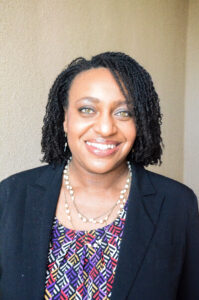By Lorena Infante Lara
Karissa Culbreath, PhD’08, is an Albuquerque, New Mexico, native with a successful career as a clinical microbiologist. Culbreath’s love of science started from the time she was young and took her from Albuquerque to Nashville to Chapel Hill, North Carolina—and eventually back to Albuquerque.
“Life may be a little squiggly line—nothing is very straight,” she said, “but just keep moving.”
Join us for our regular alumni interview and learn about Culbreath’s past—and learn about a career path you may not have known about.
What degree did you get at Vanderbilt and when did you graduate?
I received my Ph.D. in microbiology and immunology (pathology was a separate department at the time) in 2008.
What kind of research did you do?
I worked in the lab of Mary Zutter doing research on the innate immune response to Listeria infection in a mouse model.
What brought you to Vanderbilt?
I attended Fisk University, right down the street there in Nashville, and did a summer reads research program at Vanderbilt. It was a wonderful experience, and it was my first exposure to Vanderbilt. And since I was local, I was able to continue some of the work from my summer program into the fall semester and stay connected to Vanderbilt. So, Vanderbilt was at the top of the list when it came time to apply to graduate schools.
What kind of path led you to a career in science?
When people ask me how I got interested in science or when I knew I wanted to have a career in science, the answer for me is that there was never a time in my life in which I didn’t want a career in science. I’ve always been very curious about the world around me; I got dissecting kits for Christmas when I was a kid, so that’s just always been me.
But it did take me a while to figure out how I wanted that science to show up in my career. I knew that I was very interested in science and mechanisms and in understanding the world, but I also wanted my work to have a clinical application. Dr. Charles Stratton, a faculty member in the Department of Pathology who passed away [in 2022], really helped to open up the world of clinical microbiology to me. He really made a profound impact on me and my career, and I would not be in this career if it weren’t for his guidance and support. Finding the career of clinical microbiology truly gave me the perfect intersection of the science and the clinical applicability that I was looking for.
What do you do as a clinical microbiologist?
I’m the section chief and medical director of infectious disease at TriCore Reference Laboratories in Albuquerque, New Mexico. As clinical micro-biologists, we are responsible for the diagnosis and support for any infection in clinical samples. I work with hospitals, doctors’ offices, and clinics to support the diagnosis of any condition—from strep throat to HIV to sepsis—and help to provide treatment recommendations based on susceptibility testing and other factors.
When the pandemic first emerged, there weren’t very many commercially available diagnostic tests for COVID-19, so, working within regulations, we provided laboratory-developed tests and helped clinicians under-stand the test and the results. Once the commercially available tests became available, we started providing those.
What general or career advice do you have for current Ph.D. students or postdocs?
Always stay curious. You may not know the entire path that’s in front of you, but never stay still. Keep moving forward and take the next best step, and that will often get you to where you want to be.
